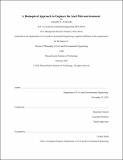A Bioinspired Approach to Engineer the Seed Microenvironment
Author(s)
Zvinavashe, Augustine T.
DownloadThesis PDF (2.587Mb)
Advisor
Marelli, Benedetto
Terms of use
Metadata
Show full item recordAbstract
Bioinspired by the tardigrade and bombyx mori, we engineer the seed microenvironment to encapsulate, preserve and deliver Rhizobium tropici. Scientific discoveries in agriculture and sustainability are at the crossroads of material science, biochemistry, agriculture and biology. They underpin the innovative technological solutions that will impact water, energy and food security (WEFS). These new technologies can then be implemented to address major societal problems that are linked to climate change, soil degradation and increasing population. In particular, our objective is to augment agricultural outputs (i.e. crop yield and production) while decreasing inputs (e.g. water, energy, fertilizers, land, pesticides) by developing new technology to deploy plantgrowth-promoting-bacteria (PGPB) in the soil to alleviate abiotic plant stressors such as soil salinity and drought. Using PGPB to reduce and complement the use of synthetic fertilizer, our design approach engineers the seed microenvironment by coating the seeds with PGPB laden biopolymers. PGPB are well known to enhance crop production and protect plants from biotic and abiotic stresses, while decreasing the need for water and fertilizers. However, the bacteria’s delicate nature has hindered their use in current agricultural practices, due to low survivability. We use a silk and trehalose mixture that is able to encapsulate, protect, preserve and deliver Rhizobium tropici to Phaseolus Vulgaris, upon sowing. The coated P.vulgaris seeds are shown to be able to significantly alleviate soil salinity and water stresses in Moroccan soil when compared with uncoated (control) P.vulgaris seeds.
Date issued
2022-02Department
Massachusetts Institute of Technology. Department of Civil and Environmental EngineeringPublisher
Massachusetts Institute of Technology